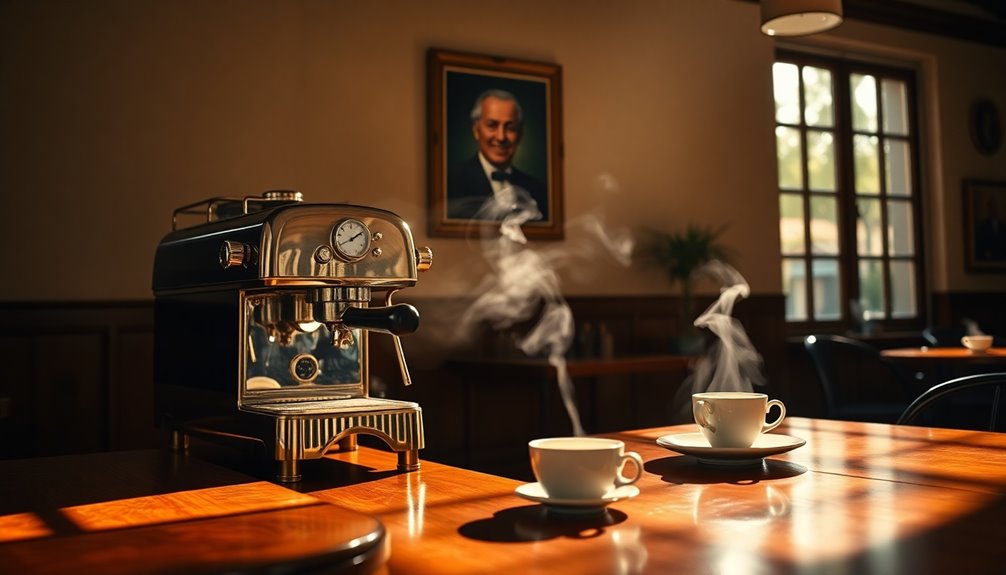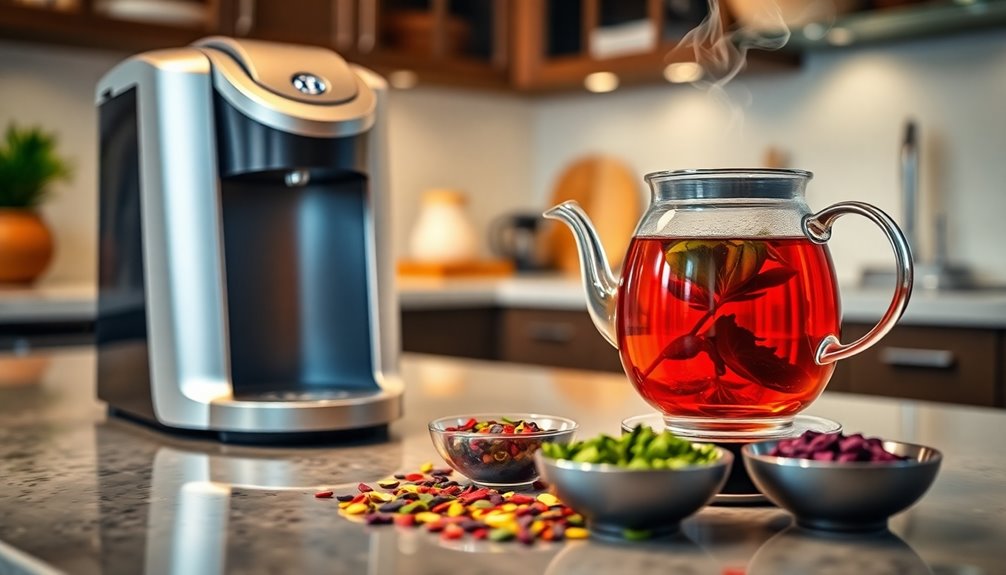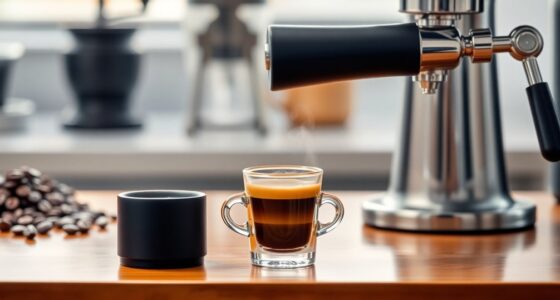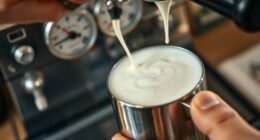To find the perfect milk frothing pitcher for your latte art, consider size, design, and material. A 15oz stainless steel pitcher is ideal for 6 to 10oz drinks, balancing control and capacity. Look for a conical shape to enhance steam circulation, and choose a pitcher with a well-designed spout to help you create intricate patterns. Regular maintenance is essential, so clean it after each use and air dry it upside down. With the right tools and techniques, you'll reveal your potential in latte artistry. There's much more to explore on how to master your frothing skills and elevate your creations.
Key Takeaways
- Choose a pitcher size based on your drink servings; 15oz is versatile for 6-10oz drinks, while 22oz suits larger beverages.
- Select a pitcher made of #304 stainless steel for durability and optimal heat retention during frothing.
- Look for ergonomic designs and specialized spouts for enhanced pouring control and intricate latte art creation.
- Ensure the pitcher has a conical shape to promote better steam circulation and achieve silky microfoam.
- Regular maintenance, including cleaning and drying techniques, is essential for maintaining the pitcher's performance and longevity.
Understanding Pitcher Sizes
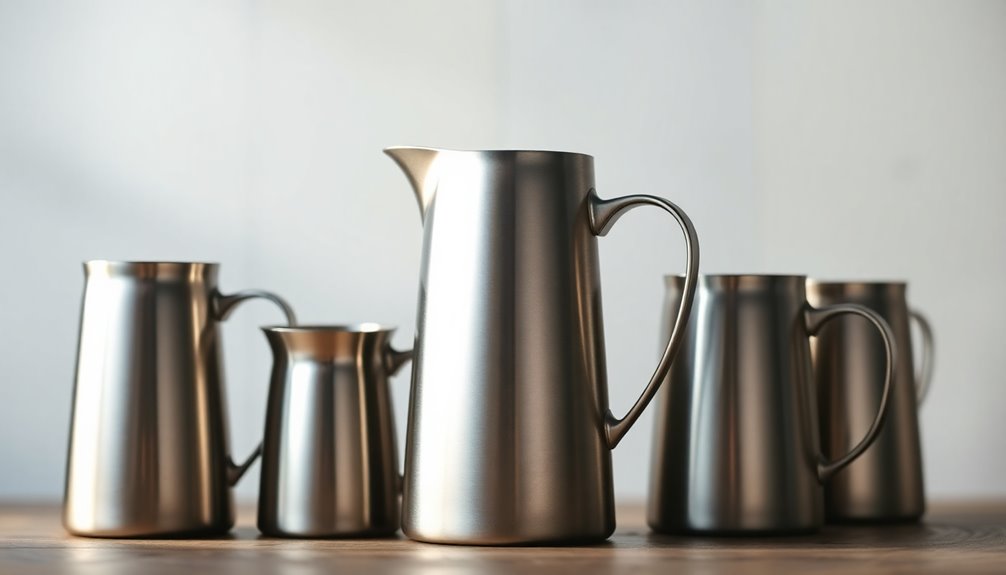
When it comes to milk frothing pitchers, sizes matter. Choosing the right size can make all the difference in your coffee experience.
If you're working with smaller cups, a 10oz milk pitcher is perfect for 6oz servings. For slightly larger cups, the 15oz option accommodates 6-10oz drinks nicely.
When crafting lattes or cappuccinos, the 17oz pitcher works well for 8-12oz cups, ensuring you achieve that creamy texture.
If you often serve larger beverages or multiple drinks, the 22oz pitcher is your go-to for 12-16oz cups.
Having a variety of milk pitchers is essential for handling different drink orders efficiently while maintaining quality.
Key Design Features
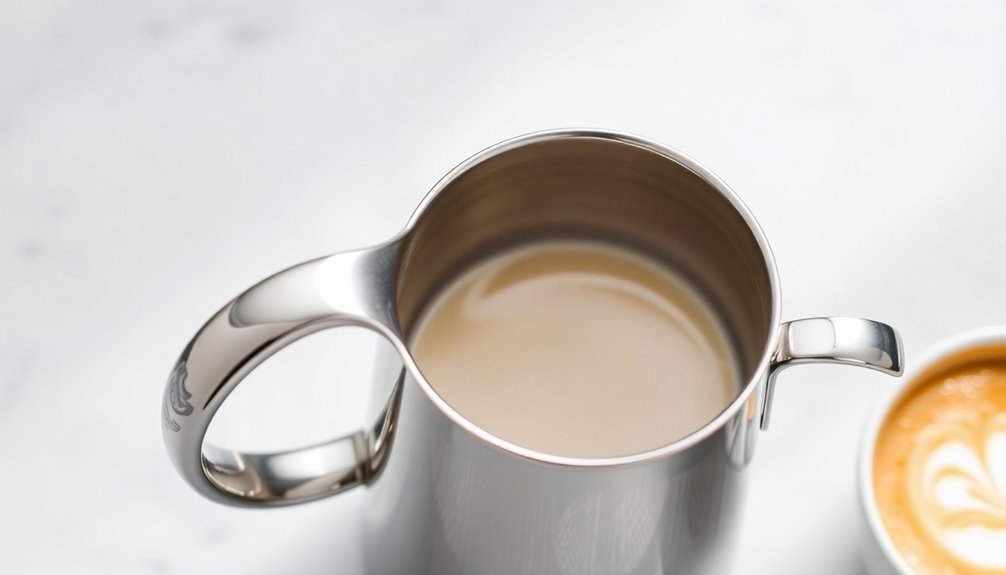
When choosing a milk frothing pitcher, the shape of the spout plays an essential role in your pouring technique and the art you create.
You'll also want to take into account the material for durability and how the size fits your frothing needs.
Understanding these key design features can elevate your latte art to the next level.
Spout Shape Importance
The spout shape of a milk frothing pitcher plays an essential role in your ability to create stunning latte art. A well-designed spout allows for precision and control, which are important for intricate designs.
For example, the Kimera Tri-Spout innovation enhances your pouring techniques, enabling you to craft high-definition latte art with ease. If you're aiming for dramatic flow and versatility, a wide spout design is key for contrasting colors and defined patterns.
Additionally, pitchers with a conical trunk shape promote better steam circulation and milk texture, significant for successful frothed milk.
Ultimately, choosing a specialized milk frothing pitcher gives you greater sensitivity during pouring, helping you achieve those complex designs requiring skill and precision.
Material and Durability
Choosing the right material for your milk frothing pitcher considerably impacts its durability and performance. For best results, look for a pitcher made from #304 stainless steel, which is rust-proof, stain-proof, and crash-proof. A non-stick Teflon coating simplifies cleaning, preventing milk residue from accumulating.
| Feature | Description |
|---|---|
| Material | #304 Stainless Steel |
| Coating | Non-stick Teflon |
| Dishwasher Safe | Yes |
An ergonomic design enhances comfort, allowing you to maintain control while pouring. Plus, a well-shaped spout is essential for crafting intricate latte art, making a high-quality milk pitcher a key tool in your barista arsenal. Invest wisely for lasting performance!
Size Versatility Considerations
A milk frothing pitcher's size can greatly impact your latte art experience. Choosing the right size guarantees you can create beautiful designs while maintaining efficiency.
Consider these options when selecting your milk frothing pitchers:
- 10oz – Perfect for single espresso shots or small cappuccinos.
- 15oz – Ideal for frothing milk for 6-10oz cups, striking a balance between size and control.
- 17oz – Offers flexibility for both medium drinks and quick service.
- 22oz – Best for larger 12-16oz servings, accommodating busy environments.
The conical shape of these pitchers enhances frothing and pouring control, elevating your latte art's quality.
Having multiple sizes at your disposal lets you respond quickly to varied customer demands, guaranteeing you always deliver the perfect cup.
Maintenance Tips

To keep your milk frothing pitcher in top shape, clean it with soap and warm water after every use.
Make certain to air dry it upside down to prevent any residual moisture from causing issues.
Cleaning After Each Use
Cleaning your milk frothing pitcher right after use is crucial for its longevity and performance. By doing so, you prevent milk fats, proteins, and sugars from hardening inside, which can lead to corrosion.
Follow these steps for effective cleaning:
- Rinse the pitcher with warm water to remove any milk residue.
- Use a few drops of soap and a non-abrasive sponge to clean the interior thoroughly.
- Rinse again with warm water to guarantee no soap remains.
- Air dry the pitcher upside down to avoid water spots and enhance its lifespan.
Regular cleaning not only guarantees hygiene but also keeps your pitcher free from lingering odors, preserving the quality of your future beverages.
Proper Drying Techniques
While it might be tempting to simply toss your milk frothing pitcher in the cupboard after washing, proper drying techniques are vital for maintaining its condition. Always air dry your milk frothing pitchers upside down to prevent water spots and promote thorough drying. This method helps extend the pitcher's longevity and avoids buildup that can harden over time. Here's a quick guide to drying your pitcher:
| Step | Description |
|---|---|
| 1. Air Dry | Place pitcher upside down on a rack. |
| 2. Wipe Exterior | Use a clean cloth to remove moisture. |
| 3. Check Moisture | Verify there's no remaining moisture. |
| 4. Store Properly | Keep in a dry, well-ventilated area. |
| 5. Regular Checks | Inspect before each use for hygiene. |
Following these tips will keep your pitcher in top shape!
Avoiding Milk Residue
Maintaining a clean milk frothing pitcher is key to avoiding milk residue that can affect your latte art and flavor. Here are some essential tips to keep your pitcher in top shape:
- Clean immediately: Rinse your pitcher with warm water and soap right after use to eliminate milk fats, proteins, and sugars.
- Inspect the spout: Regularly check and clean the spout to guarantee no residual milk affects your drinks.
- Air dry upside down: Allow your pitcher to dry upside down to prevent water spots and extend its lifespan.
- Use dedicated pitchers: Consider having separate pitchers for different types of milk to maintain flavor integrity and avoid cross-contamination.
Innovative Pitching Techniques

To master innovative pitching techniques, you need to explore the unique design features of specialized pitchers like the Kimera Tri-Spout. This pitcher enhances your control, allowing for intricate latte art designs.
Using a high flow rate pitcher, such as the WPM #30, lets you achieve dramatic pouring styles that improve definition and contrast in your art. The conical trunk shape of frothing pitchers promotes efficient milk frothing, essential for crafting the perfect microfoam texture.
Additionally, advanced pitchers are ergonomically designed for both free pouring and etching techniques, enabling you to create complex designs with precision.
With continuous practice using various pouring angles and pitcher shapes, you'll refine your skills and develop a unique latte art style that stands out.
Pricing and Availability
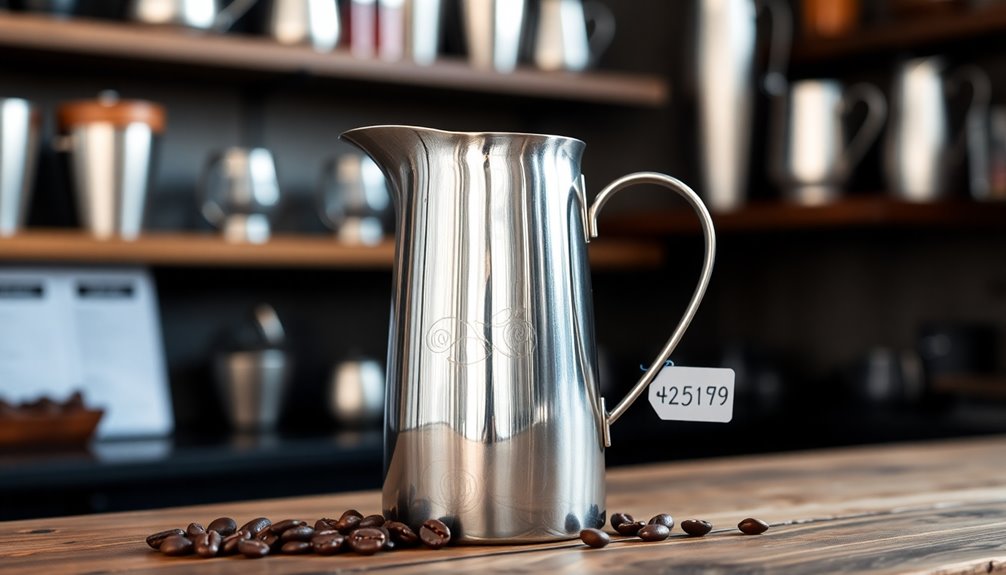
When you're looking to elevate your latte art game, understanding pricing and availability for milk frothing pitchers is essential.
Here are some great options to evaluate:
- 15oz Stainless Steel Latte Art Pitcher – Priced at $36.50, it's perfect for both professionals and home baristas.
- Blankenberg Latte Art Pitcher Bundle – Available for $40.00, this bundle includes multiple pitchers of different sizes for versatility.
- Latte Art Gift Set – Currently on sale for $71.00 (regularly $74.00), it's ideal for gifting or personal use.
- Monochrome Handleless Pitchers – Featuring shimmering coatings and colors like Cinder and Creamsicle, these stylish options will enhance your collection.
With these choices, you'll find the perfect pitcher to suit your needs.
Essential Tools for Latte Artists
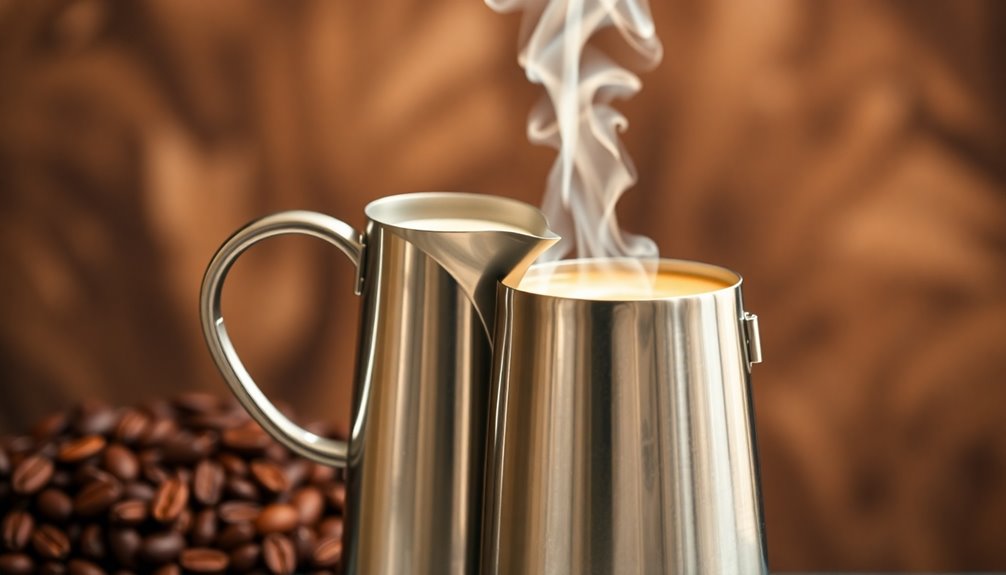
As you plunge into the world of latte art, having the right tools at your disposal can make all the difference in perfecting your technique.
Start with high-quality milk frothers to create silky microfoam, essential for that ideal texture. Invest in specialized milk frothing pitchers, available in various sizes, to enhance your pouring control.
The Cyclone WDT Tool guarantees perfect espresso extraction, while the Force Tamper assures consistency in your coffee preparation.
To take your art further, consider advanced pitchers with unique spout designs, like the Kimera Tri-Spout, for intricate pouring techniques.
Finally, practice using wooden latte art etching pens to refine your ability to create complex designs like swans and geometric shapes.
Trends in Latte Art
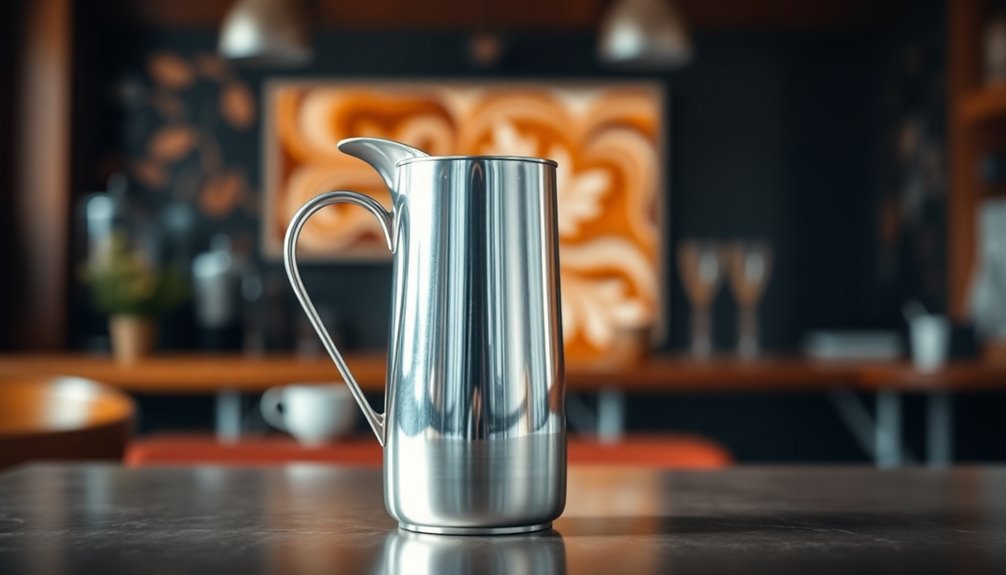
Latte art is evolving rapidly, influenced by various trends that reflect both consumer preferences and barista creativity.
As you explore these trends, you'll notice how they shape the way you enjoy your coffee:
- Plant-based Milks: Oat and almond milks are changing how we froth, with specialized pitchers improving texture.
- Social Media Influence: Platforms like Instagram inspire baristas to craft eye-catching designs to attract followers.
- Barista Competitions: These events showcase intricate latte art, pushing innovations in pitcher design for complex techniques.
- Customization: Personalized latte art is on the rise, allowing baristas to express individuality while catering to consumer tastes.
These trends highlight how latte art continues to blend creativity with consumer demands, making each cup a unique experience.
Frequently Asked Questions
What Pitcher Is Good for Latte Art?
When you're looking for a pitcher that's great for latte art, consider one that holds around 15oz. This size works well with 6-10oz cups, giving you enough control for detailed designs.
A pitcher made from 304 stainless steel is durable and maintains milk temperature. Look for features like a conical shape for ideal frothing and pouring, and if you're in a busy café, color-coded pitchers can help streamline your workflow.
How Do You Froth the Perfect Milk for Latte Art?
Did you know that using high-fat milk can increase the creaminess of your microfoam by up to 30%?
To froth the perfect milk for latte art, start with high-fat milk and heat it to around 150-155°F (65-68°C).
Use a conical frothing pitcher for better control, and employ the free pouring technique to layer your milk. Start by tilting the pitcher slightly and pouring the milk in a circular motion to create a smooth, consistent texture. As you gain confidence, gradually adjust the angle and height of your pour to achieve beautifully defined layers in your latte or cappuccino. By practicing regularly and focusing on mastering milk frothing techniques, you’ll elevate your coffee presentation and impress your friends and family with your barista skills.
Practice consistently to improve your hand stability and speed, mastering intricate designs like rosettas and tulips.
What Size Milk Pitcher for Latte Art?
When choosing a milk pitcher for latte art, consider the size based on your cup dimensions.
A 15oz pitcher works great for 6oz or 10oz cups, while a 17oz pitcher suits 8oz to 12oz cups, giving you versatility.
If you're serving larger drinks, a 22oz pitcher is best for 12oz to 16oz cups.
Each size helps you create intricate designs without overflow, so pick one that matches your serving style!
What Is the Best Shape for a Milk Frothing Pitcher?
The best shape for a milk frothing pitcher is a conical trunk design.
This shape gives you better control over the milk flow, which is essential for pouring. A narrower spout allows for precise pouring, enabling you to create detailed designs.
You'll also want a wide base for ideal frothing and a rounded body to help achieve that creamy microfoam.
An ergonomic handle will guarantee you maintain comfort and stability while pouring.
Conclusion
In the world of latte art, the right frothing pitcher transforms a simple cup of coffee into a masterpiece. While a larger pitcher offers room for creativity, a smaller one demands precision and control. You can elevate your skills with the perfect balance of size and design, turning each pour into a stunning visual treat. Embrace innovation and tradition, and let your passion for latte art shine through every meticulously crafted cup. Your journey awaits—so pour with purpose!

